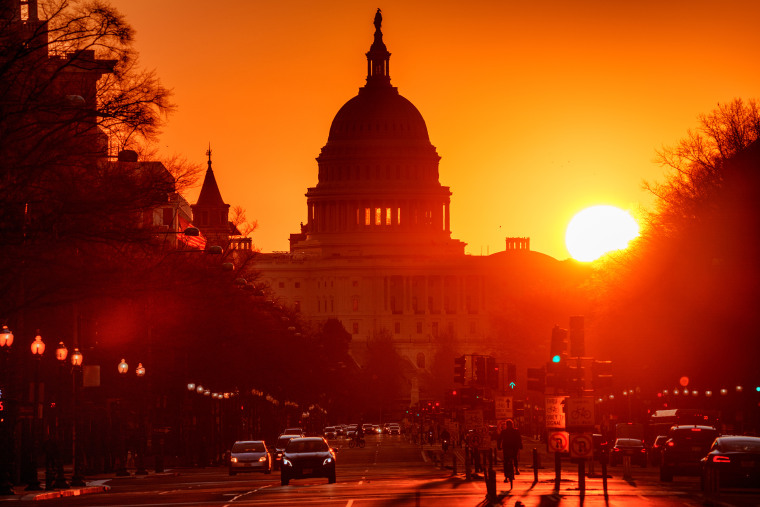WASHINGTON — The House easily passed a package of six spending bills Wednesday, teeing up a vote in the Senate to pass the legislation and avert a partial government shutdown by Friday’s deadline.
The 1,050-page bill would keep parts of the government — including the Agriculture, Commerce, Interior, Justice and Transportation departments — open through September. The package, known as a minibus, comprises six appropriations bills that were negotiated between the Republican-led House and the Democratic-controlled Senate and backed by President Joe Biden.
Passing the first tranche of funding bills is the easy part. House and Senate appropriators must next negotiate a deal for the six remaining spending bills ahead of a separate March 22 shutdown deadline. Those bills fund the Defense, State and Homeland Security departments, among other agencies and programs, and are expected to be more highly contested.
The package was passed Wednesday using a fast-track process, known as suspending the rules, that required a higher two-thirds majority to pass. The vote was 339-85.
All 100 senators would need to agree to hold a quick vote on the package to avert a partial shutdown beginning at 12:01 a.m. Saturday.
Hard-right lawmakers lambasted the package and voted against it, arguing that it would do little to cut spending and excluded their favored conservative policy riders.
"It’s a mistake. I think the American people don’t want to see us again spend more money, rack up more debt. We’re $34.4 trillion in debt. ... We’re now at $1 trillion in interest, and we’re going to spend more money to fund more programs, undermining the American people?" asked Rep. Chip Roy, R-Texas, a member of the far-right Freedom Caucus, which opposed the package.
"I keep waiting for the fight that I keep getting told is going to happen tomorrow, right?" Roy continued. "It’s like ... one of these losing sports teams says wait till next year, right? 'Oh, trust me, elect us in November. We’ll do it. Next time.' How about we do it now?"
But Speaker Mike Johnson, R-La., defended the bipartisan spending deal, saying the political “reality” is that there is divided government in Washington and a minuscule, two-vote GOP majority, “one of the smallest in history in the House.” Johnson allies have noted it’s the first time since 2018 that the government hadn’t been funded through one massive omnibus package.
And Johnson said he’s eager to begin negotiations on the next round of spending bills, for the fiscal year that begins Oct. 1.
“You can’t turn an aircraft carrier overnight. So what we did was we broke the omnibus fever,” Johnson told reporters at his weekly news conference. “We’re very happy now that we’re finally to the point we can move beyond — get FY ’24 done and then turn our attention to FY ’25.”
In recent months, Roy and other conservative rebels have floated the possibility of forcing a vote to oust Johnson over his handling of spending negotiations. But despite deep frustrations, Freedom Caucus members are shying away from those threats — at least for now.
“I’m not going to bring Johnson into this. We’re continuing to meet with him,” said one of those Freedom Caucus members, Rep. Ralph Norman, R-S.C. “But it’s irresponsible for this House to pass this minibus. It’s irresponsible to spend the kind of dollars that they’re spending."
The spending package passed Wednesday represents a series of painstaking compromises that came nearly halfway through the fiscal year after four stopgap bills to extend a series of shutdown deadlines. Both parties highlighted what they saw as key wins.
Republicans touted cuts to the FBI, the Environmental Protection Agency and the Bureau of Alcohol, Tobacco, Firearms and Explosives; more funding for the Drug Enforcement Administration; measures to bolster gun rights for veterans; and restrictions on oil sales to China.
Meanwhile, Democrats cheered the fact that the bill would fully fund the “WIC” program — food assistance for women, infants and children — as well as provide rental assistance, a pay raise for firefighters and investments in new air traffic controllers.



